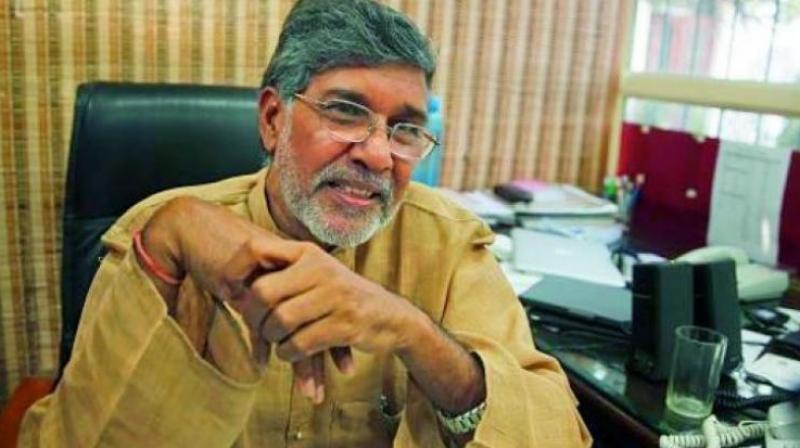Parliament must pass anti-trafficking bill now, says Kailash Satyarthi
Nikky Haley coming down to meet me first before anyone else here in the country itself was a welcome move, Kailash Satyarthi said.

With the Monsoon Session of the Parliament beginning next Wednesday, Nobel Peace laureate and renowned child rights activist Kailash Satyarthi has called upon parliamentarians to introduce the anti-trafficking bill without further delay. On the sidelines of the Golden Jubilee celebrations of Christ (Deemed to be University) in the city on Saturday, he spoke to Deccan Chronicle.
Excerpts from the interview:
The Trafficking of Persons (Prevention, Protection and Rehabilitation) Bill, 2018, popularly known as the anti-trafficking bill, is expected to provide for stringent punishment to perpetrators. After the cabinet cleared the bill, what is its status now?
It was heartening to see the cabinet approving the bill, but it has to be brought to the both houses of the Parliament in the upcoming monsoon session without further delay. Otherwise the election declaration would take place in few months’ time and the matter might be kept on hold till the next parliament. We are calling upon the government and the opposition parties to push for it. The Immoral Traffic (Prevention) Act, 1956, was completely based on instances where women are trafficked for forced sex and prostitution, but now trafficking is being done for other purposes, including slave work, forced labour, begging and such and children are targeted more nowadays. The new proposed bill, which prohibits all forms of trafficking with stringent punishments and rehabilitation and preventive measures, is hence essential as there is a sense of urgency towards this in our society with the number of cases shooting up than ever before in recent past.
The recent baby-selling scandal associated with the Missionaries of Charity in Ranchi, cases of child rape against a self-styled godman in Delhi, nine-year old girl raped by a Maulana in a madrasa – all point towards involvement of religious organisations? Your take on this?
Bachpan Bachao Andolan had approached the Supreme Court in 2015 to get a strong judgment, which ordered all state governments and central government to compulsorily register all child homes, child care centres and orphanages to ensure that they work in a transparent manner, open to regulations and checks by government agencies. This made an impact by the number of such registered centres reaching 6,000 from a mere 800. Unfortunately, faith organisations are left loose by state governments. With frequent inspection and legitimate licensing brought for them as well, the government needs to ensure strict enforcement of the judgment. Also, faith leaders, irrespective of religion or sect, should come out more strongly to oust their followers/members, who are involved in such cases.
What was the major highlight of your recent meeting with US envoy to United Nations (UN) Nikky Haley?
Haley coming down to meet me first before anyone else here in the country itself was a welcome move. We have urged her to voice for a strong, high-powered mechanism at the UN level to deal directly with all sorts of violence against children, including trafficking, slavery, issues faced by refugee children, abusing them for violent extremism and terrorism, instead of compartmentalising it to different agencies.
What were your thoughts while penning down your latest book ‘Every Child Matters’?
The book is a collection of my very recent published and unpublished articles. Through the compilation, I was trying to emphasise on the importance that should be given to – a sense of urgency, a sense of moral responsibility and to build a sense of belongingness to all that all children are our children. As four children are abused or raped every hour, during the same timeframe we are now witnessing eight child-missing cases. The fact that child pornography is now a 10 billion dollar industry is an alarming development. Hence, as the world races forward economically and technologically, one should not complain on the lack of resources in safeguarding our children.
What impact did the Bharat Yatra you completed last year as part of the #MakeIndiaSafe campaign have on improving child safety in the country?
The campaign was beneficial as it became the major push towards the cabinet approving the new anti-trafficking bill. During the yatra, President Ram Nath Kovind, Home Minister Rajnath Singh and Minister for Women & Child Development Maneka Gandhi had stressed on the fact that we need to act upon this matter urgently. Also, we heard from many, including children, that a child-friendly police system was essential. Towards this, we have started working on sensitising and spreading awareness to the officials in Madhya Pradesh, Punjab and neighbouring states to begin with. Engaging with the judiciary, including numerous high court judges, was also done for the same. We also realised that the youth who are ready to take up challenges need an outlet to express themselves. Only through them we can change the sick mindset of further victimising and stigmatising the victims, putting them into deeper agony by isolating them from the society. The social taboo that a rape victim cannot be married should change and youngsters have the power to empower them and others with this strong thought and many more.

